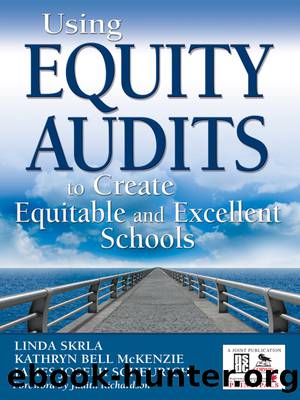Using Equity Audits to Create Equitable and Excellent Schools by Skrla Linda E.;McKenzie Kathryn B.;Scheurich James Joseph;

Author:Skrla, Linda E.;McKenzie, Kathryn B.;Scheurich, James Joseph;
Language: eng
Format: epub
ISBN: 1077625
Publisher: Corwin Press
Published: 2009-08-15T00:00:00+00:00
CHARACTERISTICS OF AN EQUITY-ORIENTED CHANGE AGENT (EOCA)
EOCA Has an Equity Attitude
We imagine that you have heard the argument that the âmeans to an endâ or a goal must have the same basic qualities as the âendâ you have in mind. In other words, if a school leader wants teachers to be caring and respectful to African American students, that school leader needs to be caring and respectful to teachers. Or if a school leader wants teachers to use more discussion and less direct teaching in the classroom, it would be helpful if the leader used more discussion and less direct talk in teacher meetings. Some would call this modeling (e.g., Bandura & Walters, 1963). You model what you want others to learn and do. Thus, if you want your colleagues to have an equity attitude toward their students, you need to have an equity attitude toward your colleagues.
What does it mean, though, to have an equity attitude toward your colleagues? To us, it means that no matter what your colleaguesâ personalities are, no matter what their attitudes or assumptions are, no matter what their prejudices and biases are (we will discuss later âcourageousâ conversations [Singleton & Linton, 2006]), you treat them with respect, appreciation, and care. If in an equity-oriented school, we want to foster all adults treating all children with respect, appreciation, and care, then we must treat all adults the very same way. If we do not do this, we undermine where we are trying to goâcreating an equity-oriented school that serves all children well. Thus, if you do not treat all adults this way, your means undermine your ends.
Of course, this is easy to say and very hard to do. We all have colleagues who are negative or cynical or who do not seem to care or who just seem to be interested in her or his paycheck or who have hostility or other negative judgments about the schoolâs children or parents or neighborhoods. We all have colleagues we do not think should even be working in our schools. We have colleagues who have short tempers. We have colleagues who will not cooperate or will not carry their fair share of the work. We have colleagues whom we do not trust to be honest with us. We have colleagues who do not think women can be as good as leaders as men or who do not think women know as much as men. We have colleagues who are prejudiced toward their colleagues who are of a different race or ethnicity than they are. We have colleagues we think are emotionally troubled. We have colleagues we believe to be destructive. We have colleagues who are always just trying to feather their nests or serve only themselves. We have colleagues who are caught up in the political games or caught up in pleasing those in authority. For many reasons, we will all have colleagues whom we do not want to work with or are hard to work with.
However, we
Download
This site does not store any files on its server. We only index and link to content provided by other sites. Please contact the content providers to delete copyright contents if any and email us, we'll remove relevant links or contents immediately.
Figuring Out Fluency in Mathematics Teaching and Learning, Grades K-8 by Jennifer M. Bay-Williams & John J. SanGiovanni(243)
The Principal's Guide to Curriculum Leadership by Sorenson Richard D.;Goldsmith Lloyd M.;Mendez Zulma Y.;Maxwell Karen T.;(171)
Macmillan Primary Grammar 2 Pupil's Book by Unknown(143)
English Grammar Practice--The Noun by Roxana Nastase(139)
Text-Dependent Questions, Grades K-5 by Douglas Fisher & Nancy Frey & Heather Anderson & Marisol Thayre(133)
Learning from Accidents 3rd ed by Trevor Kletz (2001)(128)
Harnessing Technology for Deeper Learning by Scott McLeod(120)
Deep Change Leadership by Reeves Douglas;(116)
English Language Program Administration by Unknown(115)
A Guide to Curriculum Mapping by Hale Janet A.;(110)
The Grammar Teacher's Activity-a-Day by Jack Umstatter(107)
Using Equity Audits to Create Equitable and Excellent Schools by Skrla Linda E.;McKenzie Kathryn B.;Scheurich James Joseph;(100)
Using Data to Close the Achievement Gap by Johnson Ruth S.;(99)
Differentiated Instructional Strategies for the Block Schedule by Gregory Gayle H.;Herndon Lynne E.; & Lynne E. Herndon(98)
The Power of SMART Goals by Conzemius Anne;O'Neill Jan; & Anne Conzemius(97)
Aligning and Balancing the Standards-Based Curriculum by Squires David A.;(96)
How to Do Everything with Google Tools by Unknown(94)
Beyond the RTI Pyramid by Bender William N.;(92)
You've Got to Reach Them to Teach Them by Schreck Mary Kim; & Schreck(90)
